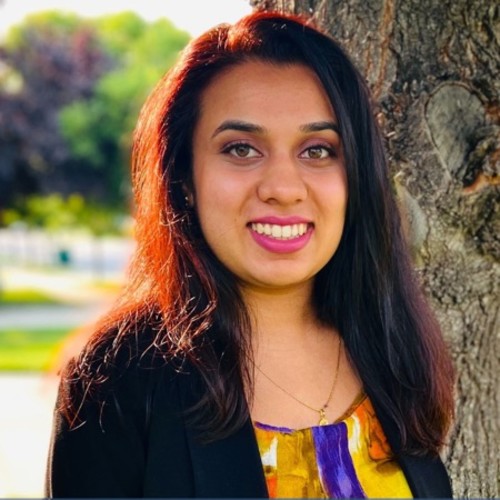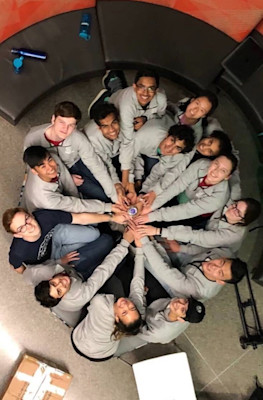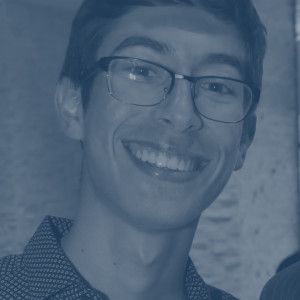Medha Aiyah, 20

During her time as a freshman at UT Dallas, a hackathon organizer spoke to her class about the benefits of hackathons, and Medha’s interest was piqued. She had no idea how much the event would have in store for her. Met with equal parts passion and cutting edge technology, she found a place where she thrived among her peers. At her first HackUTD, she worked on Klo Kloset, a project that produced outfit combinations based on a user's closet. The team didn’t finish the project, but it was the synthesis of everybody’s passion for fashion and the knowledge that Medha gained that made it a memorable, lasting introduction to hackathons.
Noticing the disparity of women and hearing why that may exist from her female cohort, Medha made it her focus to help women and non-binary students in tech feel more included. Medha created an event called EMP-WR, a weeklong camp with a curriculum aimed toward introducing more young women into STEM. She taught binary code, cybersecurity, and solar energy to fifteen students, all of which left the camp amazed by the opportunities of the tech world. Being the start of any of these students' potential dip into tech was just the beginning of positive steps toward change that Medha believes so strongly in, going on to create the first STEM Center + MakerSpace. Now over 1,000 girls have access to facilities to learn the fun of STEM.
Medha continues to empower young women in STEM through her work as an organizer. As a new logistics coordinator of HackUTD, she brought a fresh perspective to the table. She noticed that there were more and more gender-focused hackathons rising to popularity, and saw this as a great opportunity to pitch her team. The pitch was a success, and WEHack was born. The event brought in organizations focused on women in tech. This created a great support system in general and helped to ease the dramatic shift from in-person to virtual hackathons.
From organizing HackUTD, Medha understood the basic needs of a hackathon, but then the switch to virtual hackathons came. On top of that, the added pressure of trying to make WEHack a successful first time event immediately made the situation more intense. The unexpected chaos ended up being a catalyst, teaching Medha to assess and take calculated risks with the structure of the event, and stretching outside of her comfort zone to reach out to people that seemed impossible to get, but more often than not, the risk paid off.
They interviewed, raised funds, and learned to lead together as a group of 28 vetted organizers. This group mindset made WEHack come to life, drawing in 238 passionate hackers. As it all ended, Medha was flooded with messages from everyone involved expressing their thankfulness for such a fun event. The messages detailing the way that certain speakers never had a moment of disinterest, or how hackers felt their projects’ ability to make a true difference are the moments that made Medha realize that her ultimate goal had come to life. She left WEHack feeling proud of her event that succeeded in creating a sense of unity among women and non-binary folks from around the world.
Medha has plans to take her skills as an organizer to her professional career. She dreams of bringing together her community experience with her technical expertise, and hopes to eventually head up a tech company one day. For now, she got a headstart with internships at Amazon Web Services, Intel, Toyota, and PowerSchool, all of which have provided her with different perspectives on the tech industry.
These chances to bring past experiences for the sake of helping and uplifting women and non-binary people in tech are what fuel Medha. The chance to expose people to the community that she loves so much is a reward that continues to give back. With big dreams of becoming a VP, Medha has set herself up for success.
Quick Facts

Medha Aiyah, 20

During her time as a freshman at UT Dallas, a hackathon organizer spoke to her class about the benefits of hackathons, and Medha’s interest was piqued. She had no idea how much the event would have in store for her. Met with equal parts passion and cutting edge technology, she found a place where she thrived among her peers. At her first HackUTD, she worked on Klo Kloset, a project that produced outfit combinations based on a user's closet. The team didn’t finish the project, but it was the synthesis of everybody’s passion for fashion and the knowledge that Medha gained that made it a memorable, lasting introduction to hackathons.
Noticing the disparity of women and hearing why that may exist from her female cohort, Medha made it her focus to help women and non-binary students in tech feel more included. Medha created an event called EMP-WR, a weeklong camp with a curriculum aimed toward introducing more young women into STEM. She taught binary code, cybersecurity, and solar energy to fifteen students, all of which left the camp amazed by the opportunities of the tech world. Being the start of any of these students' potential dip into tech was just the beginning of positive steps toward change that Medha believes so strongly in, going on to create the first STEM Center + MakerSpace. Now over 1,000 girls have access to facilities to learn the fun of STEM.
Medha continues to empower young women in STEM through her work as an organizer. As a new logistics coordinator of HackUTD, she brought a fresh perspective to the table. She noticed that there were more and more gender-focused hackathons rising to popularity, and saw this as a great opportunity to pitch her team. The pitch was a success, and WEHack was born. The event brought in organizations focused on women in tech. This created a great support system in general and helped to ease the dramatic shift from in-person to virtual hackathons.
From organizing HackUTD, Medha understood the basic needs of a hackathon, but then the switch to virtual hackathons came. On top of that, the added pressure of trying to make WEHack a successful first time event immediately made the situation more intense. The unexpected chaos ended up being a catalyst, teaching Medha to assess and take calculated risks with the structure of the event, and stretching outside of her comfort zone to reach out to people that seemed impossible to get, but more often than not, the risk paid off.
They interviewed, raised funds, and learned to lead together as a group of 28 vetted organizers. This group mindset made WEHack come to life, drawing in 238 passionate hackers. As it all ended, Medha was flooded with messages from everyone involved expressing their thankfulness for such a fun event. The messages detailing the way that certain speakers never had a moment of disinterest, or how hackers felt their projects’ ability to make a true difference are the moments that made Medha realize that her ultimate goal had come to life. She left WEHack feeling proud of her event that succeeded in creating a sense of unity among women and non-binary folks from around the world.
Medha has plans to take her skills as an organizer to her professional career. She dreams of bringing together her community experience with her technical expertise, and hopes to eventually head up a tech company one day. For now, she got a headstart with internships at Amazon Web Services, Intel, Toyota, and PowerSchool, all of which have provided her with different perspectives on the tech industry.
These chances to bring past experiences for the sake of helping and uplifting women and non-binary people in tech are what fuel Medha. The chance to expose people to the community that she loves so much is a reward that continues to give back. With big dreams of becoming a VP, Medha has set herself up for success.
Quick Facts




